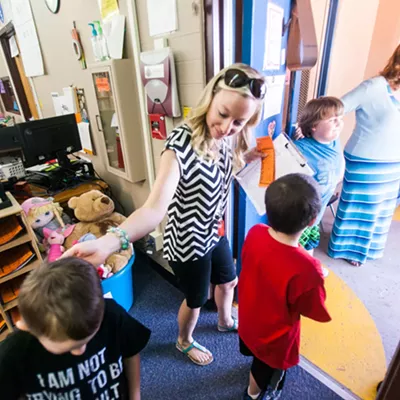Empire High is the state's first no-textbook, all-laptop public school. You read that right: No textbooks. The 340 students enrolled this year are instead given an Apple iBook laptop computer by the district. All this summer, the phones have been ringing at the Vail district office from news media wanting more info about this revolutionary method of learning.
Among the 530 private and public schools in Arizona accredited by the North Central Association Commission on Accreditation and School Improvement, none are doing what Empire High has initiated, said Don Enz, a state director for the nonprofit accreditation organization.
The technical infrastructure at Empire is already in place, even as some buildings on the campus, such as the cafeteria, are not fully constructed. Construction of the school is expected to be completed in December.
Instead of textbooks, the school opts for subscription services that feature educational materials through the Internet and CD-ROM. Students turn in their homework via e-mail, and most do their homework on the same computer that they take back and forth from home to school.
The idea to go this route formed a year-and-a-half ago, said Vail Unified School District Superintendent Calvin Baker, who says the district has been aggressive in pursuing new ideas.
Engaging students is key, Baker said, but has it been working? Empire students gave high marks to the computer-style classes and course work. The four students were selected by school officials when a Weekly reporter toured the facility.
"If you compare it to other schools, a lot of students just aren't as interested (in the schoolwork), and here, there are a lot of good students, and they really are interested," said junior Sarah Murrin, 17.
Matt Federoff, the director of technology for the district, is proud of what has been accomplished.
"We started with a bare patch of dirt and said, 'How would you build this with laptops?'" he said.
The school is now one of more than 400 educational clients of Apple Computer's One-to-One program. But it's one of the few schools that completely eliminated textbooks from the curriculum.
The choice to go with the makers of the Macintosh was not only dependent on price, but also functionality and security reasons. It was more of a Mac versus PC decision, Federoff said. The groundwork for buying the computers was already laid out due to a purchasing cooperative that works with the state of Arizona, Baker said, meaning it was more a pick-and-choose approach compared to taking bids and offers.
"Once we chose Mac, there was only one vendor," Federoff said. Apple's computers are distinctly different from computers sold by companies such as Dell or Gateway and use Apple's own equivalent to Windows, the most recent version being OS/X Tiger.
The laptops are Apple iBook machines that were haggled to around $800 each for the school. As part of the deal, Empire High also receives technical support.
The iBook is geared more for personal use and is popular with college students, according to Grant Mulvaney, a sales associate at Simutek Computers, a local store that specializes in Apple products. They normally sell for $1,000 to $1,500.
For security reasons, Internet access is routed through a main server run by the school that blocks or limits access to pornography or other questionable materials. Federoff insists the firewall is impenetrable to everyone but the most elite computer users.
When the textbook is traded in for interactive learning, other schools have found, students are more engaged.
"I think with this generation being a visual generation, they're more likely to watch to learn," said Christie Fillios, the principal for the Saint Lawrence Academy of Santa Clara, Calif., a Catholic college-preparatory high school that offers some no-textbook, all-laptop courses.
Going to all-computers is more efficient than the standard classroom setting, said some students. "It's a lot easier--it's so much easier, it's amazing," said sophomore Mia Williams, 15.
Sophomore Fred Lilly, 15, had similar feelings: "I like it quite a bit. ... I'm more organized (this) way."
Researching papers and doing schoolwork is easier, too.
"It is easier because you don't have to go through pages; you just go to the Web site, and it's there," sophomore Natasha McGee, 16, said.
Empire has attracted all types of students, which surprised administrators, said Empire Principal Cindy Lee. The school was built to meet demands, something that represents the changing face of Vail, an unincorporated community roughly 15 miles southeast of downtown Tucson. Just five years ago, the school district constructed its first high school, Cienega High.
From July 2004 to July 2005, the small but growing community added more than 1,000 new homes, according to city building permit records. (The same records show that inside the much-larger city of Tucson, more than 3,000 homes were added in the same time span.)
The growth of Vail has made it hard to keep up, Baker said.
"I mean, we're asking voters to approve a bond of $38 million in (the) November elections," he said. The district currently has a daily operations budget of $10.6 million.
For Cienega High, Vail's main high school, enrollment increased by about 100 students this year to around 1,700--despite the fact Empire High is handling a load of 340 students. Cienega is still above capacity.
The area's other high school, Vail High School, is a specialized, tech-oriented charter school funded by the district. That school has roughly 200 students.
Principal Lee expects Empire might have 500 to 700 students next year, although the school doesn't have enough computers in supply--yet.
The pen and paper isn't banished completely though, Baker said: The school will feature a regular library with books when construction is finished.










